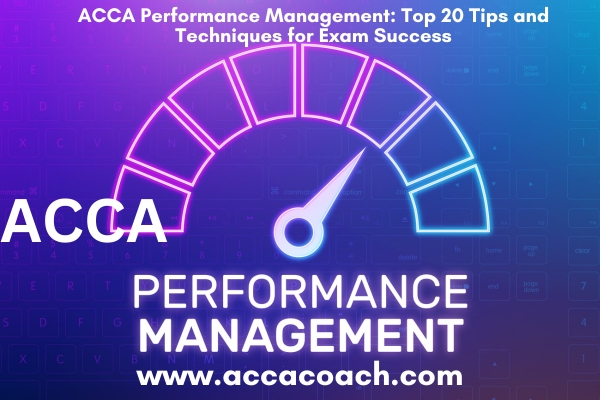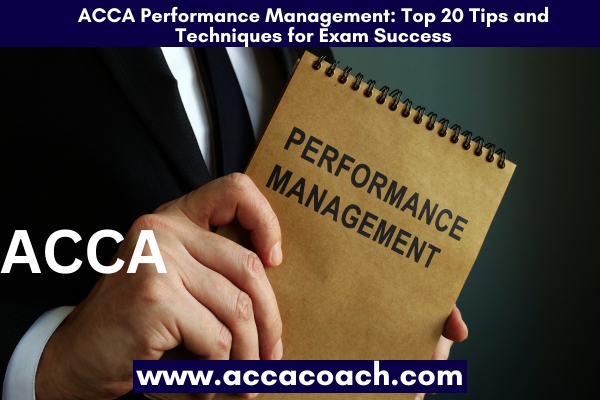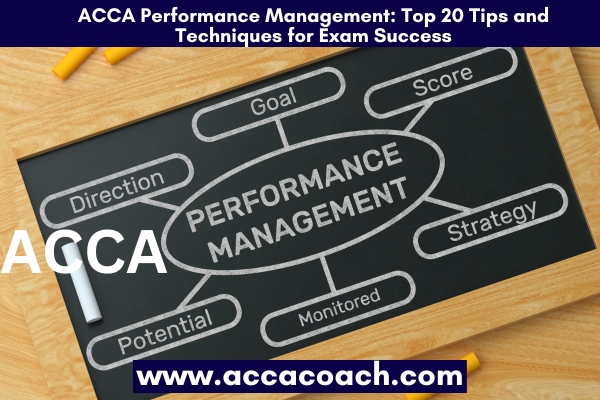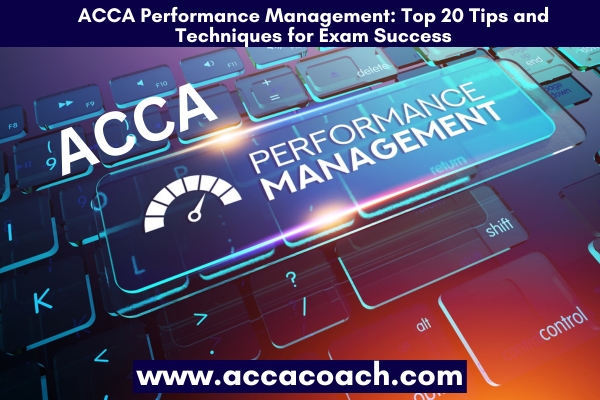ACCA Performance Management: Top 20 Tips and Techniques
Introduction:
Are you preparing for the ACCA Performance Management (PM) exam and looking for effective tips and techniques to boost your exam preparation? Look no further! The ACCA PM exam is a comprehensive assessment that requires a deep understanding of performance measurement, decision-making, and management accounting techniques.
To help you excel in this exam, we have compiled a list of valuable tips and techniques that will enhance your preparation, increase your confidence, and maximize your chances of achieving a high score. Whether you are a first-time candidate or retaking the exam, these strategies will provide you with the guidance you need to succeed.
ACCA Performance Management Top 20 Tips
1. Understand the Exam Structure:
Familiarize yourself with the ACCA PM exam structure, including the number of questions, time allocation, and weightage of each section. This understanding will help you plan your study schedule accordingly and allocate sufficient time to each topic.
2. Master the Syllabus:
Thoroughly review the ACCA PM syllabus and ensure you have a solid grasp of all the topics. Pay special attention to areas where you feel less confident and allocate extra time to strengthen your understanding.
3. Practice Past Papers:
Practice makes perfect. Solve as many past papers as possible to get acquainted with the exam format, question types, and time management. Analyze your performance, identify areas of improvement, and focus on enhancing your weaker areas.
4. Understand the Marking Scheme:
Gain a clear understanding of the ACCA PM marking scheme. Know how marks are allocated for different question types, such as multiple-choice questions, calculations, and written responses. This knowledge will help you prioritize your approach to maximize your score.
5. Time Management:
Time management is crucial during the exam. Practice solving questions within the allocated time frame to improve your speed and accuracy. Plan your approach to ensure you answer all questions and leave enough time for review.

6. Develop Exam Technique:
Develop effective exam techniques, such as reading the question carefully, identifying keywords, and structuring your answers logically. Utilize bullet points, diagrams, and calculations where appropriate to enhance the clarity of your responses.
7. Understand Costing Techniques:
Master costing techniques such as absorption costing, marginal costing, and activity-based costing. Understand their applications, advantages, and limitations to tackle related questions confidently.
8. Analyze Performance Measures:
Be well-versed in performance measures, including key performance indicators (KPIs), balanced scorecards, and financial ratios. Understand their significance and how they can be used to evaluate organizational performance and make informed decisions.
9. Practice Variance Analysis:
Variance analysis is a crucial topic in ACCA PM. Practice calculating and interpreting different types of variances, such as material, labor, and overhead variances. Understand the reasons behind variances and how they impact performance evaluation.
10. Master Budgeting:
Budgeting is a fundamental aspect of performance management. Understand the budgeting process, including the preparation, monitoring, and control of budgets. Practice creating different types of budgets, such as sales, production, and cash budgets.
11. Study Relevant Standards:
Familiarize yourself with relevant accounting and performance management standards, such as International Financial Reporting Standards (IFRS) and International Performance Reporting Standards (IPRS). Stay updated with any recent changes or updates.
12. Utilize Study Resources:
Make use of study resources provided by ACCA, such as textbooks, study guides, and online materials. These resources are designed to help you understand complex concepts and provide practice questions for self-assessment.

13. Join Study Groups:
Engage in study groups or forums where you can discuss concepts, share insights, and clarify doubts. Collaborating with fellow students can enhance your understanding and provide different perspectives on challenging topics.
14. Seek Guidance from Tutors:
If you find certain topics particularly challenging, consider seeking guidance from experienced tutors or mentors. They can provide personalized support, clarify doubts, and offer valuable exam tips.
15. Enhance Time-Value-of-Money Skills:
Time-value-of-money concepts, such as present value, future value, and discounted cash flow, are integral to performance management. Strengthen your understanding of these concepts and practice applying them to relevant scenarios.
16. Develop Effective Calculation Skills:
ACCA PM involves numerous calculations. Enhance your calculation skills and speed by practicing regularly. Use calculators efficiently and familiarize yourself with relevant formulas and shortcuts.
17. Stay Updated with Industry Trends:
Performance management is influenced by industry trends and developments. Stay updated with the latest news, case studies, and industry practices to enrich your understanding and enhance your ability to analyze real-world scenarios.
18. Review Examiner’s Reports:
ACCA releases examiner’s reports after each exam session. Review these reports to understand common mistakes made by candidates and areas where students typically struggle. Learn from these insights and avoid similar pitfalls.
19. Take Mock Exams:
Simulate exam conditions by taking mock exams. Set aside dedicated time to complete a full-length practice exam to assess your readiness, identify areas for improvement, and get accustomed to the exam environment.
20. Maintain a Positive Mindset:
Maintain a positive mindset throughout your exam preparation journey. Stay motivated, believe in your abilities, and approach the exam with confidence. A positive mindset can boost your performance and help you overcome exam-related stress.

ACCA Performance Management: top 20 Techniques
1. Cost-Volume-Profit (CVP) Analysis:
Master the CVP analysis technique, which helps in understanding the relationship between costs, volume, and profit. Practice calculating break-even points, target profits, and analyzing the impact of changes in sales volume or cost structure.
2. Activity-Based Costing (ABC):
Understand the ABC technique, which allocates costs based on activities and resources consumed. Practice identifying cost drivers, allocating costs to products or services, and analyzing the profitability of different activities.
3. Standard Costing:
Learn how to set standard costs for materials, labor, and overheads. Practice calculating variances and analyzing the reasons behind them. Understand how standard costing can help in performance evaluation and control.
4. Relevant Costing:
Master the technique of relevant costing, which involves analyzing costs and revenues that are relevant to specific decision-making situations. Practice identifying relevant costs and revenues in scenarios such as make or buy decisions, pricing decisions, and product discontinuation decisions.
5. Transfer Pricing:
Understand different transfer pricing methods and their implications for multinational organizations. Practice calculating transfer prices and analyzing their impact on divisional performance and overall profitability.
6. Risk and Uncertainty Analysis:
Learn how to analyze and incorporate risk and uncertainty in decision-making. Practice using techniques such as sensitivity analysis, decision trees, and expected value calculations to make informed decisions under uncertain conditions.

7. Performance Measurement:
Familiarize yourself with different performance measurement frameworks, such as the balanced scorecard and key performance indicators (KPIs). Practice selecting appropriate KPIs, setting targets, and evaluating performance against benchmarks.
8. Budgeting and Forecasting:
Master the techniques of budgeting and forecasting. Practice preparing budgets, including sales, production, and cash budgets. Understand the importance of budgetary control and variance analysis in performance evaluation.
9. Pricing Strategies:
Understand various pricing strategies, such as cost-based pricing, market-based pricing, and value-based pricing. Practice applying these strategies in different scenarios and analyzing their impact on profitability and market positioning.
10. Capital Investment Appraisal:
Learn how to evaluate capital investment projects using techniques such as net present value (NPV), internal rate of return (IRR), and payback period. Practice calculating these metrics and making investment recommendations based on the results.
11. Performance Reporting and Analysis:
Master the skill of preparing performance reports and analyzing the results. Practice interpreting financial and non-financial performance indicators and communicating insights to stakeholders effectively.
12. Time-Series Analysis:
Understand the technique of time-series analysis, which involves analyzing historical data to identify patterns and make forecasts. Practice using techniques such as moving averages, exponential smoothing, and trend analysis to predict future performance.

13. Target Costing:
Learn how to use target costing to determine the cost at which a product or service should be offered to meet customer requirements and achieve desired profitability. Practice setting target costs and identifying cost reduction opportunities.
14. Responsibility Accounting:
Understand the concept of responsibility accounting, which involves assigning responsibility for costs and revenues to specific individuals or departments. Practice preparing responsibility reports and analyzing performance based on these reports.
15. Throughput Accounting:
Familiarize yourself with throughput accounting, a technique that focuses on maximizing the rate at which products pass through the production process. Practice identifying and managing bottlenecks to improve overall profitability.
16. Cost of Quality Analysis:
Learn how to analyze the costs associated with quality, including prevention costs, appraisal costs, and failure costs. Practice identifying areas for quality improvement and assessing the financial impact of quality initiatives.
17. Learning Curve Analysis:
Understand the learning curve concept, which states that as workers gain experience, they become more efficient and productive. Practice using learning curves to estimate future costs, improve productivity, and make informed staffing decisions.
18. Revenue Management:
Master the technique of revenue management, which involves optimizing pricing and capacity allocation to maximize revenue. Practice analyzing demand patterns, setting prices, and implementing revenue optimization strategies in industries such as hospitality and airlines.

19. Cost Behavior Analysis:
Understand how costs behave about changes in activity levels. Practice identifying fixed costs, variable costs, and semi-variable costs. Analyze cost behavior patterns to aid in decision-making and cost control.
20. Data Analytics:
Develop skills in data analytics, including using spreadsheet software and data visualization tools. Practice analyzing large datasets, identifying trends and patterns, and drawing meaningful insights to support decision-making.
Conclusion:
Preparing for the ACCA Performance Management exam requires a strategic approach and a solid understanding of various tips and techniques.
By implementing the tips provided in this article and mastering the techniques mentioned, you’ll be well-equipped to tackle the challenges of the ACCA PM exam.
Remember to allocate sufficient time for study, practice past papers, seek guidance when needed, and maintain a positive mindset throughout your exam preparation journey.
With dedication, perseverance, and the right set of techniques, you can confidently approach the ACCA PM exam and achieve your desired results. Good luck!
(ACCA Advanced Performance Management (APM): An In-Depth Overview)
